Related Research Articles
The Coalition Against the Marcos Dictatorship was a North America-based antiimperialist organization that was at the center of the international movement opposing the dictatorship of Philippine President Ferdinand Marcos from the 1970s.
The 1992 election of members to the Senate of the Philippines was the 24th election to the Senate of the Philippines. It was held on Monday, May 11, 1992. This was the first general election under the 1987 Philippine Constitution. An estimated 80,000 candidates ran for 17,000 posts, from the presidency all the way down to municipal councilors.
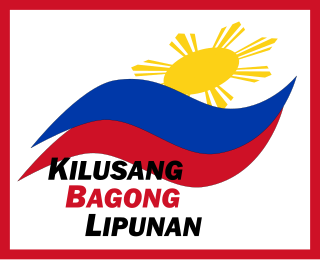
The New Society Movement, formerly named the New Society Movement of United Nationalists, Liberals, et cetera, is a right-wing political party in the Philippines. It was first formed in 1978 as an umbrella coalition of parties supporting then-President Ferdinand E. Marcos for the Interim Batasang Pambansa and was his political vehicle during his 20-year regime. It was reorganized as a political party in 1986, and is the furthest to the right of the political spectrum among active parties after Marcos' ouster.

The Partido Demokratiko Pilipino is a syncretic political party in the Philippines founded in 1982. It was previously known as Partido Demokratiko Pilipino–Lakas ng Bayan (PDP–Laban) from 1983 to 2024 as a result of a merger with Lakas ng Bayan (Laban). It was part of the country's ruling party coalition from 1986 to 1992 under the administration of Corazon Aquino and the country's ruling party from 2016 to 2022 under the administration of Rodrigo Duterte.
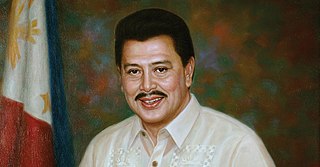
The 1998 Philippine presidential and vice presidential elections were held on May 11, 1998. In the presidential election, Vice President Joseph Estrada won a six-year term as President by a landslide victory. In the vice-presidential race, Senator Gloria Macapagal Arroyo won a six-year term as Vice President, also by a landslide victory. This was the third election where both the president and vice president came from different parties.
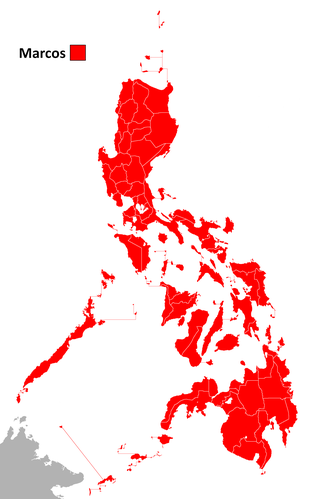
The 1981 Philippine presidential election and national referendum was held on June 16, 1981. President Ferdinand E. Marcos of the Kilusang Bagong Lipunan (KBL) defeated retired general and World War II veteran Alejo Santos of the Nacionalista Party in a landslide victory. Most opposition parties boycotted the election as a sign of protest over the 1978 election for the Interim Batasang Pambansa, which they condemned as fraudulent. At the same time, a national referendum was held on the question in holding elections for barangay elections in 1982.
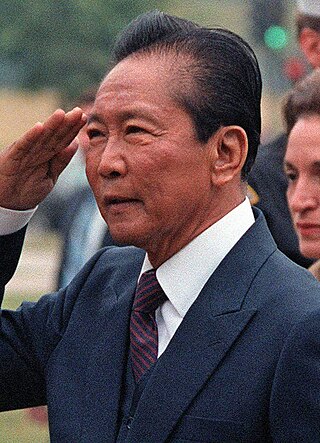
A parliamentary election was held in the Philippines on April 7, 1978, for the election of the 165 regional representatives to the Interim Batasang Pambansa. The leading opposition party, the Lakas ng Bayan (LABAN), ran twenty-one candidates for the Metro Manila area. Their leading candidate was the jailed opposition leader Ninoy Aquino. Marcos regime's party known as the Kilusang Bagong Lipunan (KBL), which was led by the then-First Lady Imelda Marcos. Ninoy was allowed to run by his fellow partymates under the Liberal Party, who boycotted the election and was not allowed to campaign, and so his family campaigned for him. The night before the election on April 6, 1978, a noise barrage was organized by the supporters of (LABAN) which occurred up to dawn.

A parliamentary election was held on May 14, 1984, in the Philippines. Like past elections, charges of bribery, protests and complaints on irregularities marred the elections. Former Manila Times publisher Chino Roces and former senator and opposition leader Jose W. Diokno supported the campaign boycotting the election. The National Movement for Free Elections (NAMFREL) helped mitigate electoral fraud during the election.
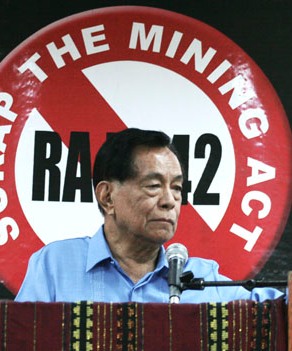
Local elections for governors, vice governors, mayors and vice mayors in the nation's first elections for provincial and municipal officials since the declaration of martial law were held on January 30, 1980. As usual, President Ferdinand Marcos's party the Kilusang Bagong Lipunan dominated the elections. The Lakas ng Bayan and the Liberal Party-backed National Union for Liberation did participate but most of them lost except for some like Aquilino Pimentel, Jr. who won the mayoral election in Cagayan de Oro by a landslide.

Genuine Opposition (GO) was an electoral alliance in the Philippines that contested the 2007 Philippine general election. The alliance's members were in opposition to President Gloria Macapagal Arroyo. It was originally called the United Opposition (UNO), founded by Makati mayor Jejomar Binay in June 2005 to unite all politicians who wanted to impeach President Arroyo. UNO then reorganized itself and changed its name to Grand and Broad Coalition (GBC), with the UNO party under that coalition. On February 15, 2007, the group changed its name again to Genuine Opposition after a meeting with Senate President Manny Villar due to the defection of senators Edgardo Angara, Tessie Aquino-Oreta, and Tito Sotto to Arroyo's senatorial slate, TEAM Unity.

The Nacionalista Party is the oldest political party in both the Philippines and in Southeast Asia in general. It is responsible for leading the country throughout most of the 20th century since its founding in 1907; it was the ruling party from 1935 to 1946, 1953–1961 and 1965–1978.
Lakas ng Bayan, abbreviated as Laban, was a political party in the Philippines formed by Senator Ninoy Aquino for the 1978 Interim Batasang Pambansa regional elections. The party had 21 candidates for the Metro Manila area, all of whom lost, including Ninoy. The party's acronym (Laban) is a Filipino word meaning "fight".
The Grand Alliance for Democracy (GAD) was a political multi-party electoral alliance during the 1987 Philippine legislative election. The coalition opposed the policies of incumbent president Corazon Aquino and her Lakas ng Bayan (LABAN; People's Power) coalition, while severing ties with ousted president Ferdinand Marcos. The coalition consisted mostly of defectors from the Kilusang Bagong Lipunan (New Society Movement), Marcos' political party, the Nacionalista Party and the United Nationalist Democratic Organization, the coalition that supported Aquino during the 1986 presidential election.

Presidential and vice presidential elections, legislative elections and local elections were held in the Philippines on May 11, 1992. An estimated 80,000 candidates ran for 17,000 posts from the presidency down to municipal councillors in the first general election under the 1987 Constitution. Even though she was permitted by the Constitution to run for a second term, President Corazon Aquino did not stand for re-election.
Elections for the House of Representatives in the Philippines were held on May 11, 1987. This was the first legislative election since 1984, the first House of Representatives elections since 1969, and the first election since the People Power Revolution that overthrew president Ferdinand Marcos and brought Corazon Aquino to power after alleged election fraud by the former during the 1986 presidential election against the latter.
Elections for the House of Representatives of the Philippines were held on May 8, 1995. Being the first midterm election since 1938, the party of the incumbent president, Fidel V. Ramos's Lakas-NUCD-UMDP, won a plurality of the seats in the House of Representatives.
The Citizen National Guard (CNG) was a Filipino nationalist and neo-nationalist political advocacy group founded in 2017 by Antonio Valdés. It was established by supporters of Philippine President Rodrigo Duterte. The group's aims were to "defend the country, protect the people and support the president" from perceived opponents, including Islamist and Marxist–Leninist–Maoist extremists, organized crime groups, and supporters of the Liberal Party, the Liberals being the largest party in opposition to Duterte's PDP–Laban.
The slogan "Sa ikauunlad ng bayan, disiplina ang kailangan" was a political catchphrase created by the administration of Philippine President Ferdinand Marcos after his declaration of martial law, as a justification for his authoritarian rule and in an effort to promote the "new society". Continuing the racist trend of government propaganda from the Philippines' Spanish and American colonial periods to portray Filipinos as children unable to govern themselves, the slogan was used to justify the "disciplining" of Philippine society by a "benevolent strongman" who knows what is best and who could therefore "lead the country through a period of chaos".

Antonio Gumba Parlade Jr. is a former Filipino military officer who retired as commander of the Armed Forces of the Philippines Southern Luzon Command in 2021, and was best known for his combative terms as spokesman for the Philippine Army before he was removed from that post in 2011, and later, as spokesperson of the National Task Force to End Local Communist Armed Conflict (NTF-ELCAC).
References
- 1 2 Gía Samonte, Mauro (November 29, 2021). "Parladé, the Chosen One". Manila Times .
- ↑ Teehankee, Julio (January 2022). "The Legacy of the Kilusang Bagong Lipunan: Authoritarian Contamination in Philippine Party Politics" (PDF). Squarespace.
- ↑ "Pro-Du30 group forms political party". Manila Standard. Retrieved October 11, 2018.
- ↑ "Katipunan ng Demokratikong Pilipino political party launched". CNN Philippines. August 31, 2018. Archived from the original on October 11, 2018. Retrieved October 11, 2018.
- ↑ "Ex-NTF-ELCAC spokesperson Antonio Parlade Jr runs for president". Rappler. November 15, 2021. Retrieved November 15, 2021.
- ↑ Pimentel, Boying. "Small band of Fil-Ams and immigrants who defied a dictator". Inquirer.net. Retrieved October 11, 2018.
- ↑ "Katipunan ng mga Demokratikong Pilipino (KDP) records, 1966–1988".
- ↑ Teehankee, Julio (January 2022). "The Legacy of the Kilusang Bagong Lipunan: Authoritarian Contamination in Philippine Party Politics" (PDF). Squarespace.
- ↑ "Katipunan Ng Demokratikong Pilipino". www.gavagives.com. Retrieved April 11, 2019.
- 1 2 3 "Partido para sa kinabukasan". Katipunan ng Demokratikong Pilipino. November 11, 2021.
- 1 2 3 "VERA FILES FACT CHECK: Video with multiple FALSE claims on Marcos' Swiss bank accounts back online". Vera Files. November 4, 2021. Retrieved March 24, 2022.
- ↑ "VERA FILES FACT CHECK YEARENDER: Marcos Jr.'s presidential bid props up pro-Marcos propaganda". Vera Files. December 18, 2021. Retrieved March 24, 2022.